WUDSN (Waseda University Doctoral Student Network) November 2011 Events
2011.10.19
Thursday, November 10th, 2011
東アジアにおける高等教育の国際化と英語による国際プログラム(IP-EMIs)の「地域の創造」に対するインパクト
- Presenter: 嶋内佐絵(SHIMAUCHI, Sae)
- PhD Student / GIARI Research Assistant at Graduate School of Asia-Pacific Studies (GSAPS), Waseda University
- Research Fellow at Japan Society for the Promotion of Science (JSPS).
東アジア地域においては、民間の進学志向や高等教育の大衆化、近年における急速な経済成長と国境を越えた人的交流の促進に伴い、各国における高等教育機関でも「国際化」と呼ばれる動きが進展してきた。その中でも、近年増加してい教育プログラムの教授媒介言語を英語にし、英語のみで学位取得を可能にした「International Program(国際プログラム)」である。これらの英語による教育プログラムは、国際社会における国内学生の競争力向上とグローバル人材の育成などの目的のほかに、言語の多様性が豊かな東アジアの高等教育において、英語が教授媒介言語になることによって域内留学の形に柔軟性が生まれ、海外の多様な言語・社会的背景を持った留学生を誘致することを可能にし、東アジア地域内の留学生移動の促進要因ともなっている。さらには、東アジア共同体構想の一環としてアジア版エラスムス計画とも言われる「キャンパス・アジア構想」が現実化し、高等教育分野における国境を越えた域内相互依存関係が進展しつつある。このような潮流を踏まえ、当研究では高等教育の国際化とその中での教育プログラムにおける教授媒介言語の問題に着目し、東アジア地域における将来的な地域共同体形成と、その文脈の中で位置付けられる地域的な高等教育政策の中で、教育媒介言語の問題を議論するためのフレームワークを提示し、今後の地域的共同体形成へ向けた高等教育の地域的発展のための示唆としたい。
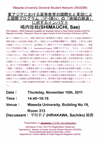 Poster [138KB]
Poster [138KB]
Abstract [89KB]
Date: Thursday, November 10th, 2011
Time: 14:45-16:15
Venue: Waseda University, Building No.19,Room 313
Discussant: 平川幸子 (HIRAKAWA, Sachiko) 助教
Presentation in Japanese (日本語; No Interpreter)
Admission Free / No Pre-Registration Required
Organized by: Waseda University Doctoral Student Network (WUDSN)
Supported by: Global Institute for Asian Regional Integration (GIARI)
About WUDSN
Tuesday, May 31st, 2011
"QUANTITATIVE ANALYSIS OF THE EFFECTIVENESS OF INTERNATIONAL ENVIRONMENTAL AGREEMENTS"
- Presenter: KIM YOOMI
- PhD Student, Waseda University
The rapid increase in trans-boundary environmental problems has created a need for greater role of global cooperation among nations. Scholars' interest in the effectiveness of international environment agreements (IEAs) has increased in line with the significant increase of IEAs since 1970s. IEAs are the one of the representative international institutional instruments for coping with global environmental degradation. Therefore, analyzing and evaluating the effectiveness of IEAs is needed for the further sustainable development. However, there are not yet sufficient studies using quantitative analysis and discussions about the practical effectiveness of IEAs are still controversial.
Previous studies have primarily been case studies, due to diversity of characteristic of IEAs and difficulties of collecting data and evaluating the effectiveness of IEAs. However, in line with an increasing number of IEAs and building databases of IEAs, quantitative studies have been conducted utilizing various methodologies.
Also, the majority of previous studies have been utilized the data from particular agreements, so they have a limited ability to grasp an overall characteristics of IEAs. Moreover, results from previous studies are also open to dispute. While some scholars insist that their results show positive effects of IEAs on environmental performances, other studies have raised questions about the actual effectiveness of IEAs using empirical evidences. Therefore, there are strong needs to broaden research subjects and models to comprehend the practical effectiveness of IEAs more clearly in order to establish the shape of effective international environmental cooperation.
This study attempts to answer the question: what kind of IEAs are effective on eliminating or reducing particular environmental problems? To answer this question, this presentation is organized as follows.
- The first section offers the review of previous studies which examine the effectiveness of IEAs through quantitative approaches.
- In the second section, each IEA's effectiveness and factors influencing the effectiveness of IEAs are examined by doing empirical analysis. In terms of methodology, panel data which contains not only particular IEAs, but various IEAs are used for regression analysis.
- The last section presents concluding remarks including suggestions for the further sustainable development from the viewpoint of international environmental governance.
Date: Tuesday, May 31st, 2011
Time: 12:30-14:00
Venue: Waseda University, Building No.19, Room 309
Presentation in English (No Interpreter)
Admission Free / No Pre-Registration Required
Organized by: Waseda University Doctoral Student Network (WUDSN)
Supported by: Global Institute for Asian Regional Integration (GIARI)
Wednesday, June 15th, 2011
中国文化と外交関係
- Presenter: 上村威(UEMURA, Takeshi)
- PhD Student & GIARI Research Assistant at Graduate School of Asia-Pacific Studies (GSAPS), Waseda University.
本論文は中国文化とその外交との関係性を明らかにすることを目的とする。具体的には、中国文化を強く反映した「関係(グァンシー)」という特殊な関係性に焦点を当て、それがどのように中国の対外認識と外交政策の形成に影響を与えるかについて分析する。そのためにまず「関係(グァンシー)」の特徴を整理し、それに基づいて中国外交の行動パターンに関する一連の仮説を立て、日本、旧ソ連、ベトナムおよびアメリカと中国との国際関係の分析を通じてその妥当性を検証していく。なお、今回の報告では特に1972年に日中国交正常化が実現してから2000年ころまでの日本との関係性を扱う。
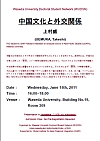 Poster [93KB]
Poster [93KB]
Abstract [154KB]
Date: Wednesday, June 15th, 2011
Time: 16:00-18:00
Venue: Waseda University, Building No.19, Room 309
Presentation in Japanese (日本語; No Interpreter)
Admission Free / No Pre-Registration Required
Organized by: Waseda University Doctoral Student Network (WUDSN)
Supported by: Global Institute for Asian Regional Integration (GIARI)
Thursday, July 14th, 2011
中国における日本企業の収益性とその決定要因について
- Presenter: 劉曙麗(Liu Shuli)
- PhD Student & GIARI Research Assistant at Graduate School of Asia-Pacific Studies (GSAPS), Waseda University
本報告は、中国の個票データベースから日本企業を選別し、独自のデータベースを構築する事により、計量の手法で、以下の課題を分析したものである:
- 日系企業の収益性は、中国における中華系・外資系と比べ、どのようなレベルになっているか、
- 日系企業の収益性は、どのような要因に決定されているのか。
- さらに、全体として分析できない生産工程別に産業限定で実証分析を行う。
実証分析から得た知見を活かし、日系企業の中国での収益性の向上にも改善法を提示してくれると思われる。特に産業別、生産工程別による細かい分析により得た結果から、日系企業がそれぞれの状況を踏まえて戦略を立てるのにも参考となるだろう。さらに日本企業の海外進出、海外生産経営をサポートする政府関連機関にも政策インプリケーションにも役に立てる研究と思われる。
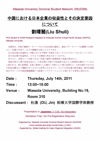 Poster [134KB]
Poster [134KB]
Abstract [124KB]
Date: Thursday, July 14th, 2011
Time: 13:00-15:00
Venue: Waseda University, Building No.19, Room 310
Discussant: 杜進 (DU, Jin) 拓殖大学国際学部教授
Presentation in Japanese (日本語; No Interpreter)
Admission Free / No Pre-Registration Required
Organized by: Waseda University Doctoral Student Network (WUDSN)
Supported by: Global Institute for Asian Regional Integration (GIARI)
Thursday, October 6th, 2011
“Recognizing Regions: The Role of Recognition in Regional Cooperation”
- Presenter: Bernard ONG
- Asia Fellow at the Global Institute for Asian Regional Integration (GIARI);
- PhD Candidate at GSAPS
In the presentation, Mr. Ong focuses on the power of recognition in shaping regional cooperation. He hypothesizes that the extent of recognition accorded to a region has an influence on its development. Then, he examines the hypothesis with newly released U.S. declassified diplomatic records and discusses how recognition was traded between ASEAN and three foreign powers, namely, the U.S., Japan and the European Economic Community, during the grouping’s formative years. He illustrates that the strengthening of a regional concept is influenced by the willingness of, and the extent to which, foreign powers recognize the entity.
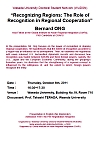 Poster [134KB]
Poster [134KB]
Abstract [124KB]
Date: Thursday, October 6th, 2011
Time: 16:30-17:30
Venue: Waseda University, Building No.19, Room 710
Discussant: Prof. Takashi TERADA, Waseda University
Presentation in English (No Interpreter)
Admission Free / No Pre-Registration Required
Organized by: Waseda University Doctoral Student Network (WUDSN)
Supported by: Global Institute for Asian Regional Integration (GIARI)

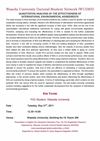 Poster [93KB]
Poster [93KB]